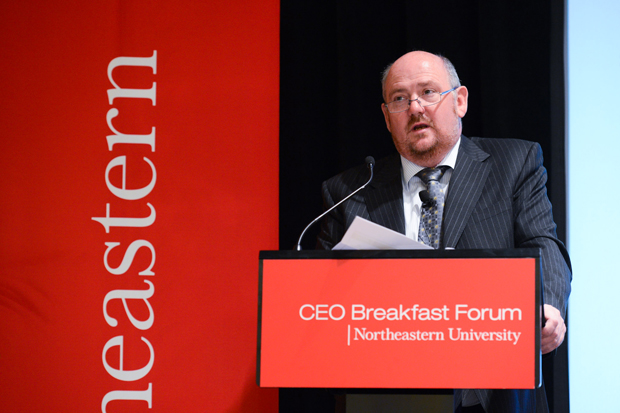The economic power of outsourcing

Richard Cousins, the CEO of Compass Group, the world’s largest food service company, believes in the economic power of outsourcing.
“If the contract food service industry produces great food and outstanding service at a lower cost than in-house providers, then we should see excellent growth,” he explained. “It’s as simple as that.”
Cousins addressed more than 100 fellow CEOs and senior executives at Northeastern University’s first international CEO Breakfast Forum last Friday in Strand, London. Since its inception in the early 1990s, the forum has featured top speakers including Brian Moynihan, CEO of Bank of America; Jeff Immelt, CEO of GE; and Steve Forbes, CEO of Forbes Media.
Over the course of the hourlong event, Cousins outlined his company’s plan for global expansion in a presentation titled, “The World in 2025: Shifts in Attitudes and Economic Power.”
Compass currently employs more than 470,000 people and serves more than 4 billion meals per year to some 30 million consumers in approximately 50 countries. The company, which has revenues of $25 billion and a market cap of $20 billion, operates in offices and factories; schools and universities; hospitals and senior living communities; major sports and cultural venues; and remote mining camps and offshore platforms.
The food service giant’s biggest client in higher education is Northeastern University, with whom it has partnered with since 1973. In August, the university was named to the Princeton Review’s “Green Honor Roll” in part because of its commitment to sustainable food practices.
Northeastern President Joseph E. Aoun praised the partnership in his introductory remarks. “We are very happy with the product and what you do for us,” Aoun told Cousins, whom he characterized as a diligent business leader focused on “managing his company and moving it forward.” “Part of what makes us sustainable is the fact that our food services are local and organic.”
Cousins, for his part, praised Northeastern’s signature model of global experiential education. “Like Compass, Northeastern has grown into a global organization and recognizes the importance of having an international presence and investing in growth,” he said. “Its approach to educating students in the outside world is a testament to the university’s forward-thinking attitude.”
In his presentation, Cousins noted that growth in the food service sector would increase in parallel with the rise of emerging markets in China, India and Brazil, countries in which Compass revenues are steadily climbing by up to 30 percent each year. “Put all these numbers together and the whole balance of Compass will shift quite radically over the next five years,” he explained.
Cousins sees another huge business opportunity in countries such as Italy, France and Germany. According to his keen business savvy, these countries could save up to $15 billion a year by outsourcing food services in health care facilities.
“The future is uncertain and the economic outlook in some countries is tough,” Cousins said. “But one reason why I am optimistic is that nearly 90 percent of our business is international, which gives us a remarkably robust model.”





